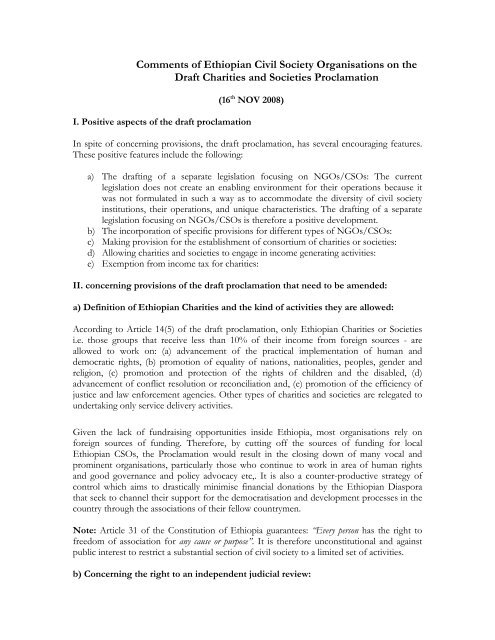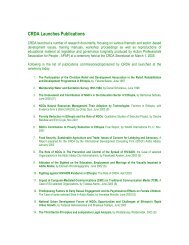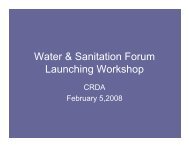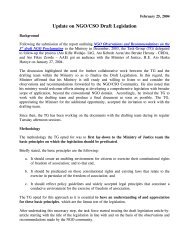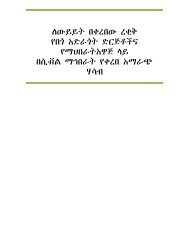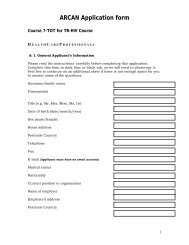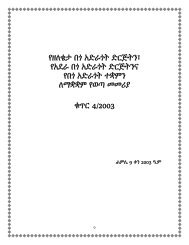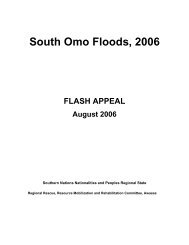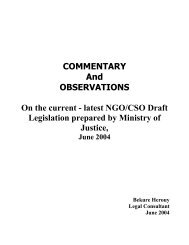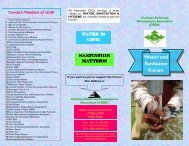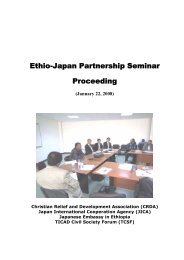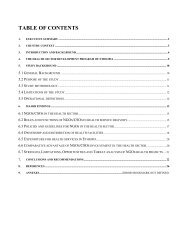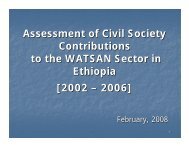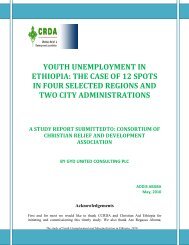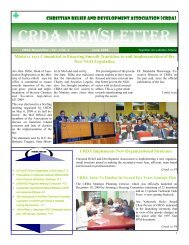Comments of Ethiopian Civil Society Organisations ... - CRDA Ethiopia
Comments of Ethiopian Civil Society Organisations ... - CRDA Ethiopia
Comments of Ethiopian Civil Society Organisations ... - CRDA Ethiopia
You also want an ePaper? Increase the reach of your titles
YUMPU automatically turns print PDFs into web optimized ePapers that Google loves.
<strong>Comments</strong> <strong>of</strong> <strong><strong>Ethiopia</strong>n</strong> <strong>Civil</strong> <strong>Society</strong> <strong>Organisations</strong> on theDraft Charities and Societies Proclamation(16 th NOV 2008)I. Positive aspects <strong>of</strong> the draft proclamationIn spite <strong>of</strong> concerning provisions, the draft proclamation, has several encouraging features.These positive features include the following:a) The drafting <strong>of</strong> a separate legislation focusing on NGOs/CSOs: The currentlegislation does not create an enabling environment for their operations because itwas not formulated in such a way as to accommodate the diversity <strong>of</strong> civil societyinstitutions, their operations, and unique characteristics. The drafting <strong>of</strong> a separatelegislation focusing on NGOs/CSOs is therefore a positive development.b) The incorporation <strong>of</strong> specific provisions for different types <strong>of</strong> NGOs/CSOs:c) Making provision for the establishment <strong>of</strong> consortium <strong>of</strong> charities or societies:d) Allowing charities and societies to engage in income generating activities:e) Exemption from income tax for charities:II. concerning provisions <strong>of</strong> the draft proclamation that need to be amended:a) Definition <strong>of</strong> <strong><strong>Ethiopia</strong>n</strong> Charities and the kind <strong>of</strong> activities they are allowed:According to Article 14(5) <strong>of</strong> the draft proclamation, only <strong><strong>Ethiopia</strong>n</strong> Charities or Societiesi.e. those groups that receive less than 10% <strong>of</strong> their income from foreign sources - areallowed to work on: (a) advancement <strong>of</strong> the practical implementation <strong>of</strong> human anddemocratic rights, (b) promotion <strong>of</strong> equality <strong>of</strong> nations, nationalities, peoples, gender andreligion, (c) promotion and protection <strong>of</strong> the rights <strong>of</strong> children and the disabled, (d)advancement <strong>of</strong> conflict resolution or reconciliation and, (e) promotion <strong>of</strong> the efficiency <strong>of</strong>justice and law enforcement agencies. Other types <strong>of</strong> charities and societies are relegated toundertaking only service delivery activities.Given the lack <strong>of</strong> fundraising opportunities inside <strong>Ethiopia</strong>, most organisations rely onforeign sources <strong>of</strong> funding. Therefore, by cutting <strong>of</strong>f the sources <strong>of</strong> funding for local<strong><strong>Ethiopia</strong>n</strong> CSOs, the Proclamation would result in the closing down <strong>of</strong> many vocal andprominent organisations, particularly those who continue to work in area <strong>of</strong> human rightsand good governance and policy advocacy etc,. It is also a counter-productive strategy <strong>of</strong>control which aims to drastically minimise financial donations by the <strong><strong>Ethiopia</strong>n</strong> Diasporathat seek to channel their support for the democratisation and development processes in thecountry through the associations <strong>of</strong> their fellow countrymen.Note: Article 31 <strong>of</strong> the Constitution <strong>of</strong> <strong>Ethiopia</strong> guarantees: “Every person has the right t<strong>of</strong>reedom <strong>of</strong> association for any cause or purpose”. It is therefore unconstitutional and againstpublic interest to restrict a substantial section <strong>of</strong> civil society to a limited set <strong>of</strong> activities.b) Concerning the right to an independent judicial review:
Only <strong><strong>Ethiopia</strong>n</strong> organizations (those groups that receive less than 10% <strong>of</strong> their income fromforeign sources) are allowed to appeal to court against the decision <strong>of</strong> the administrativeorgan, and even in this case the ground <strong>of</strong> appeal is restricted to error <strong>of</strong> law although it isobvious that the overwhelming majority <strong>of</strong> the potential conflict would be on error <strong>of</strong> factsthan law. International organizations do not have any right <strong>of</strong> appeal to court whateverdecision is made against them by the administrative bodies;The draft Proclamation denies CSOs their right to access to justice which is guaranteedunder Article 37 <strong>of</strong> the FDRE Constitution and therefore unconstitutional.c) Requirement <strong>of</strong> regional Representation:The draft legislation under Article 58(6) states that national CSOs need to haverepresentation from and branches in five regions. This rule applies to any society whosename implies a national/federal mandate. This provision is arbitrary and unreasonable fordifferent reasons.A CSO might, when it is established, open an <strong>of</strong>fice in Addis Ababa only,though, as its name might indicate, it might plan to open <strong>of</strong>fices in otherparts <strong>of</strong> the country later. It is therefore unreasonable to expect a CSO whichhas not even obtained legal personality to open <strong>of</strong>fices in five or moreregions before registration.A society formed to promote national dialog on policy issues mighteffectively undertake its activities in Addis Ababa (which is the seat <strong>of</strong> policymakers at the Federal level), while occasionally organizing workshops insome <strong>of</strong> the regions. Under these circumstances, requiring such a society toopen <strong>of</strong>fices in 5 regions sounds unreasonable.Moreover, given the administrative cost is limited to 30%, it would bedifficult or impossible for any organization to open five branches in fiveregions at a time.d) Mass Based OrganizationArticle 58(7): states that <strong><strong>Ethiopia</strong>n</strong> mass organizations may actively participate in thedemocratization process, especially in monitoring elections, conducting seminars andunderstanding platforms <strong>of</strong> candidates seems to imply that these activities are reserved tosuch mass organizations. This is an ambiguous provision as it is not clear if it means that
other societies are barred from engaging in advocacy activities related to the democratizationprocess, especially in civic and voter education, organisation <strong>of</strong> forums for public debates,election observation. The discriminatory selection and privileging <strong>of</strong> mass-basedorganisations to engage in such activities cannot be justified and accepted.Moreover, the revised proclamation that determined the powers <strong>of</strong> the Election Board thatwas enacted in 2007, provided that determining which type <strong>of</strong> societies can participate inelections and civic education is within the mandate <strong>of</strong> the Election Board. Thus, the twoprovisions contradict each other.e) Self-RegulationThe law fails to provide recognition for self-regulation by the sector. There is no provisioneven in the preamble which encourages the sector for self regulation.f) Administrative Cost:The draft legislation also puts a limit on charities from allocating more than 30% <strong>of</strong> theirexpenses towards administrative costs. It creates unnecessary hurdles for them as in somecircumstances it may be difficult to differentiate administrative expenses from programmecosts. The administrative share <strong>of</strong> the cost <strong>of</strong> a charity is determined by various variables andshould not be fixed arbitrarily. It is better to provide a range to accommodate a diversity <strong>of</strong>institutional set-ups.f) Composition <strong>of</strong> the board.According to Article 8, the Board shall have seven members to be nominated by thegovernment, two <strong>of</strong> which shall be nominated from the charities and societies. This sameboard is given the power to hear appeal from decision <strong>of</strong> the Agency. Therefore, In order toensure the interest and demands as well as accountability and independence/ autonomy <strong>of</strong>charities and societies, the number <strong>of</strong> representatives from charities and societies should beraisedh) Concerning tax exemptions and income generating activitiesT he draft legislation recognises the legality <strong>of</strong> income generating activities and exemptingcharities from income tax. This will enable the organisations to build their capacity; these arehence very useful measures. However, the draft legislation fails to recognize that charitiesand societies should also be exempted from VAT and customs duty for imports <strong>of</strong> goodsand equipment necessary for their operations.
I) Transition period:T he requirement that they have to register within one year <strong>of</strong> the coming into effect <strong>of</strong> theproclamation means that most <strong>of</strong> them (i.e., the indigenous ones) will need to makeadjustments that will drastically affect their programme orientation and scale <strong>of</strong> operation, ifthey manage to survive financially.The period <strong>of</strong> transition should be extended to at least three years so that existingassociation can have enough time to finalize projects at hand and see to adjust themselveshow to operate under the new Proclamation; to survive or die.


